
Technology and Democracy
Technology is the battleground for the future. The rapid adoption of digital technology has transformed how governments operate; how citizens engage and what they expect of leaders; how elections take place; what political campaigns look like; and the threats that democratic actors face.

Whether the digital revolution supports or unravels democracy depends in large part on the capacity of democratic actors to deploy digital technologies in ways that advance transparency, inclusion, accountability, responsiveness, and citizen engagement, while adjusting to a changing threat landscape, in which disinformation, hate speech, and cyberattacks can be deployed rapidly, cheaply, and at scale. IRI’s work seeks to equip democratic actors with digital skills, tools, and understanding to tilt those systems in ways that further the democratic cause.
IRI’s Technology & Democracy programming recognizes, strives to prevent, and builds resiliency to the threats of the digital revolution, but is optimistic that democratic actors have the resiliency and ingenuity to embrace that revolution in ways that further the democratic cause. Successful programs incorporate an understanding of the digital landscape and thinking about digital tools in all stages of the program lifecycle – including program design, implementation, and monitoring, evaluation, and learning (MEL). In designing or implementing digital democracy programming, IRI staff apply four principles:
Principle 1: Technology and innovation are means to an end, not ends in themselves.
IRI’s mission is to advance democracy worldwide, not to create new tech tools. Hence, considering the utility of innovative digital tools in context of the program’s country is key to any IRI technology program design.
Principle 2: Support the solutions closest to the problem.
The best technology and innovations are created by those who will use it. IRI works closely with grassroots innovators who have the best understanding of the problem or opportunity, the most dedication, and the clearest grasp of potential challenges. Programs that support grassroots actors also have the second order effect of developing local level capacity that will remain after the programs finish.
Principle 3: Start small, fail fast, learn, iterate, and scale what works.
Digital makes it easy to test assumptions. Before fully committing to creating the most ambitious version of a program, IRI starts out by testing the demand, ease of deployment, and processes behind it. Once it has been established that an approach is effective, IRI scales the elements that work while remaining sufficiently flexible to increase efficiency and reach.
Principle 4: Be intentional about inclusivity.
Thirty-five percent of people globally do not have internet access. Of those who do, there are wide variations in how the Internet is accessed, at what speed, and at what level of agency and privacy. Deployed with intentionality, digital campaigns, and technological solutions can further access and inclusion, but the default tends to exacerbate existing inequalities. IRI ensures that all programming is developed with an understanding of what those inequalities are and how they play out in the digital environment.
Information Integrity
IRI’s approach to information integrity focuses on reducing the impact of information integrity threats on democratic stakeholders, institutions, and processes. As all information ecosystems are unique and prone to evolution, IRI focuses on building the capacity of and directly supporting democratic actors to respond effectively in their local contexts, and then scaling and sharing relevant learning and best practices globally.
IRI implements information integrity programs in every region of the world. Under this portfolio, IRI has launched a project assessing the pre-elections online information space of countries globally. The assessments culminate in reports that provides an overview of topics such as political systems, online trends, potential risks, the state of information integrity, vulnerable groups affected by information integrity threats, risks of offline violence, etc. The report is intended to serve as a resource for key digital democracy stakeholders – namely civil society, journalists, independent media, and other implementing partners – to better prepare and mitigate against the risks/threats ahead of their elections. IRI has completed assessments ahead of elections in Guatemala and Zimbabwe in 2023, and Ghana in 2024.
Besides this, examples of other information integrity projects include the BEACON project, a Europe-wide effort that that uses data-driven analysis to develop political alliances to push back against Russian soft-power meddling in democratic processes. The BEACON team published a Media Monitoring Handbook in 2021 that serves as a basic starting point for researchers interested in conducting media monitoring but are not sure where to start as well as those looking to ensure methodological best practices are being applied. In Taiwan, IRI has supported innovative grassroots responses to China-linked election and health disinformation in country, and platforms those approaches in Asia and elsewhere in order to inspire and inform other civil society organizations combatting similar threats. This project led to the release of a joint report “Detecting Digital Fingerprints: Tracing Chinese Disinformation in Taiwan” with Graphika and the Institute for the Future.
Key resources published:
- Combating Information Manipulation: A Playbook for Elections and Beyond, jointly created with the National Democratic Institute and Stanford Internet Observatory, to increase the capacity of democracy partners to identify, respond, and build resilience to efforts to undermine election-related information integrity.
- Political Parties Playbook: A Guide for Digitizing Party Operations, designed to equip political parties of all capacity levels with the best practices, tools and guidance needed to expand their operations online and increase their overall capacity to operate digitally.
- Going Digital: A Playbook for Legislatures, designed to guide legislatures seeking to replicate core functions safely and efficiently online when normal operations have been disrupted, and also for those looking to increasingly incorporate digital operations in their everyday legislative business.
Civic and Government Technology
IRI recognizes that combating digital threats and countering the negative use of technology only goes so far – we believe it is critical to develop a positive alternative: a positive global vision for what a digitally empowered democracy could – and should – look like. Through IRI’s civic and govtech programs, we support democratic actors the world over who are already using technology to advance democratic principles. The beneficiaries we support range from citizens using the Internet to organize and equalize who has a voice; sub-national governments implementing policies and technologies to increase accountability; and national governments deploying technology platforms to develop greater consensus.
IRI examines these local and subnational efforts, determines what works and shares that information with the global community of civic- and govtech actors. We aim to inspire technologically experienced and inexperienced actors alike to invest in innovative efforts to advance towards a positive vision of a digitally native democracy. IRI is investing in supporting the scaling, replication, and entrenchment of these subnational initiatives through financial and technical support – starting small, finding what works, iterating, and expanding our efforts as needed.
Internet Freedom
Democratic activists across the globe face increasing censorship and state surveillance intended to thwart their efforts to promote rights and freedom. IRI beneficiaries operating in repressive environments find that technologies, such as censorship circumvention tools, are critical to enhancing the capacity of independent media to operate in Latin America; the counter-surveillance technologies that help CSOs collaborate in the Middle East; and, in Asia, piercing information firewalls and supporting activists in repressive societies.
IRI supports critical internet freedom technologies and tools widely used by at-risk IRI partners to enable citizens worldwide to exercise their fundamental human rights online and to share these key technologies and resources with IRI partners who are less knowledgeable and do not have access to these resources. There is often an artificial separation between those developing internet freedom technologies and traditional democracy programming, which has led to a systematic lack of awareness of these tools in the traditional democracy community, as well as user interfaces that are needlessly inaccessible to those without a technology background. IRI is working to bridge this gap and develop user-friendly tools for non-technical users.
Please find an inventory of applications that IRI’s Technology & Democracy Practice regards as trusted tools for the DRG community. This inventory is not intended to be comprehensive. It is a curated set of resources which may provide invaluable for democratic actors to operate and work in a practical, safe, and secure way.
Cybersecurity
Digital safety has become essential to ensuring the full political participation of vulnerable groups and individuals as they govern, run for office, organize advocacy campaigns, or participate in social movements. Without appropriate digital safety measures, democratic activists can be undermined by their own governments, hate groups, or foreign malign actors cheaply, easily, and at scale. This is true for every democratic actor, regardless of whether they consider technology to be important to their work. Cybersecurity and digital safety capacity building is thus embedded every IRI program.
To minimize partners and beneficiaries’ digital risks when implementing IRI programming in the field, IRI’s Technology and Democracy team created resources, such as the Cybersecurity Campaign Playbook, and trains these democratic actors on digital safety and cybersecurity risks and best practices. IRI aims to normalize these measures throughout the lifecycle of each program and activity so that cybersecurity programming and security and safety considerations are built into the core framing of all IRI programs globally and that IRI adheres to “do no harm” principles.
In order to help IRI partners understand their specific digital threat landscape, IRI has developed a self-guided digital security assessment tool. This resource was designed to help individuals and organizations around the globe operating in restrictive and repressive environments identify digital threats that may disrupt their work and threaten their safety.
Emerging Technologies
Societies around the world are being shaped by the rapid development and use of new technologies. In the fight for democracy, both leaders for democratic change and autocrats alike leverage emerging technologies for their own purposes. With the increasing availability of artificial intelligence (AI) tools, an important dynamic will be how AI systems can be used to help move countries toward democracy; how autocrats and other malignant actors can use AI to thwart democratic change; and how democracies can ensure emerging technologies are developed with respect for democratic principles, human rights and fundamental freedoms.
IRI’s Technology and Democracy Practice focuses on building partner capacity to better understand, use and influence emerging technologies in ways that enhance rather than undermine the democratic cause. IRI aims to identify risks emerging technologies present to democracies, identify opportunities for democratic applications, and develop recommendations to guide partners as they establish guardrails for the safe use of these technologies. IRI’s Generative AI and Democracy Working Group specifically aims to answer to these questions, and intends to map threats, and share concerns, opportunities and recommendations for democratic actors to keep in mind as they consider the use of artificial intelligence and its impacts on democracies.
Technical Experts

Hui Hui
Technology & Democracy, Advisor
Jared
Ford
Director, Technology and Democracy
Latest News

Human-Centered Design in Democratic Development: E…
IRI’s Recently Launched Actionable Steps Workbook, Developed Through a Co-Creation Process

Generative AI’s Growing Impact On Democracy: Lesso…
Over the course of this historic year of elections, IRI’s Technology and Democracy (TechDem) Practice has been tracking how artificial…

Advancing Local Digital Solutions: Insights from I…
This past March, the International Republican Institute’s (IRI) Technology and Democracy Practice attended the 12th Information Communication Technology for Development…

Disrupting Democracy? How Generative AI Harms and …
Since becoming widely accessible to the public in late 2022, generative AI (GenAI) has been used for positive democratic outcomes,…

Artificial Intelligence and Our Democracies: A Loo…
Although artificial intelligence (AI) has been at play in our everyday lives for years, the recent advancements in generative AI…

Equipping Women Leaders to Thrive in the Digital A…
In the rapidly evolving landscape of global politics, harnessing the power of digital technology has become paramount. With Bangladesh’s election…

IRI’s Regional Civic and Govtech Convening…
Connecting Grassroot Actors and Public Servants to Create a Tech-Empowered Democratic Future
Challenges and Successes to Scaling and Sustaining…
With technology’s rapid adoption, new threats and opportunities have emerged, transforming how democracies – and democracy advancement organizations like the…

Cybersecurity for Civil Society: A Case Study…
The International Republican Institute’s (IRI) Technology and Democracy team strives to prevent and build resiliency to the threats emerging from…

Congressional Digital Transformation Bridging the …
Recently, the House Democracy Partnership (HDP) traveled to Bogota, Colombia to implement a technical assistance consultancy (TAC). Central to HDP’s…
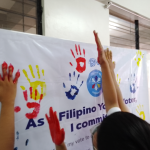
A Re-Written History: How Digital Misinformation i…
Ahead of the May 9, 2022, elections, civil society organizations (CSOs) in the Philippines have set their sights on the…

Environmental Protection: A Chance for the Serbian…
Environmental hazards may have a crucial impact on democratic transition in the Western Balkans. This is particularly true in Serbia,…
Latest Resources
Digital Security Assessment Tool
In order to help IRI partners understand their specific digital threat landscape, IRI has developed a self-guided digital security assessment…

Democracy in the Age of Generative AI: A White Pap…
Navigating Risks and Harnessing Opportunities

Ghana 2024 Elections: A Risk Assessment of the Onl…
Acknowledgments This report was made possible through the writing and research of Diana Kurth and Hui Hui Ooi. We thank…

The Global Expansion of PRC Surveillance Technolog…
Implications for Human Rights and International Governance
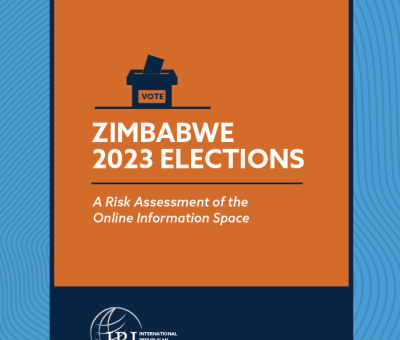
Zimbabwe 2023 Elections: A Risk Assessment of the …
Acknowledgements The development of this report was made possible through the writing and research of Hui Hui Ooi and Ana…
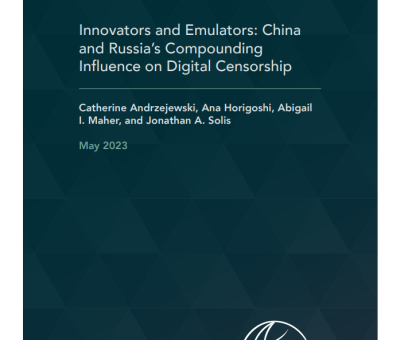
Innovators and Emulators: China and Russia’s…
Authoritarian governments, like those of Russia and China, increasingly serve as role models for autocratizing states and export their tools…
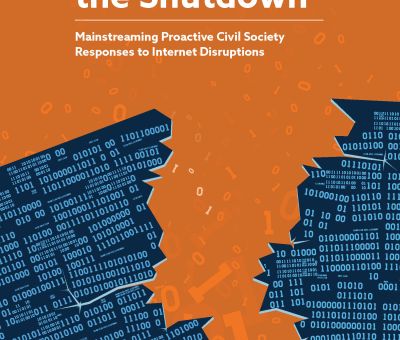
Shutting Down the Shutdown: Mainstreaming Proactiv…
Copyright © 2023 International Republican Institute. All rights reserved. Permission Statement: No part of this work may be reproduced in…
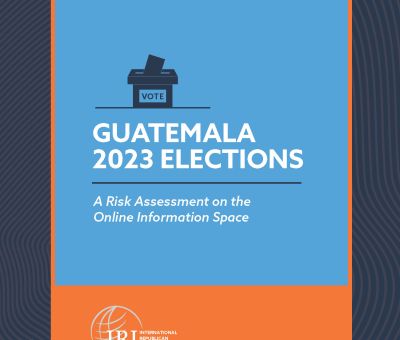
Guatemala 2023 Elections: A Risk Assessment on the…
Acknowledgments The development of this report was made possible through the writing and research of Hui Hui Ooi and Ana…
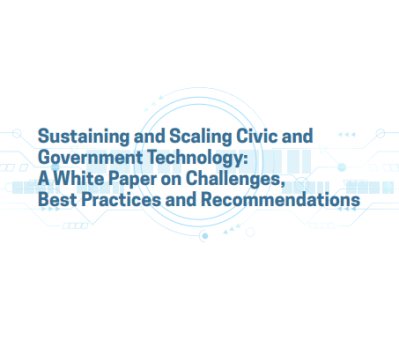
Sustaining and Scaling Civic and Government Techno…
A White Paper on Challenges, Best Practices and Recommendations
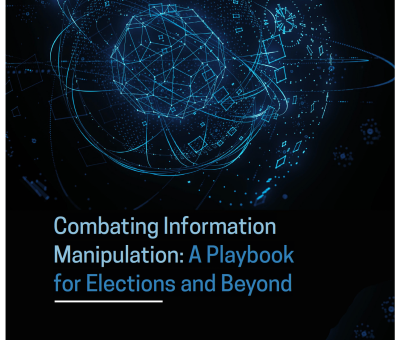
Combating Information Manipulation: A Playbook for…
Introduction Over the past few years, the International Republican Institute (IRI), the National Democratic Institute (NDI) and the Stanford Internet…
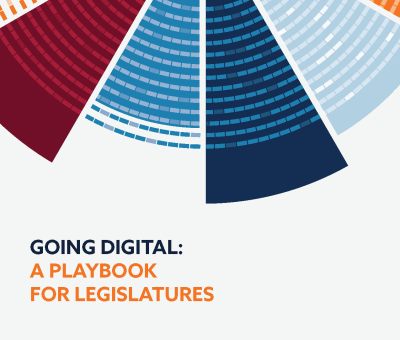
Preliminary Statement of the IRI International Obs…
Overview of the Mission This preliminary statement is offered by the international observation mission of the International Republican Institute for…